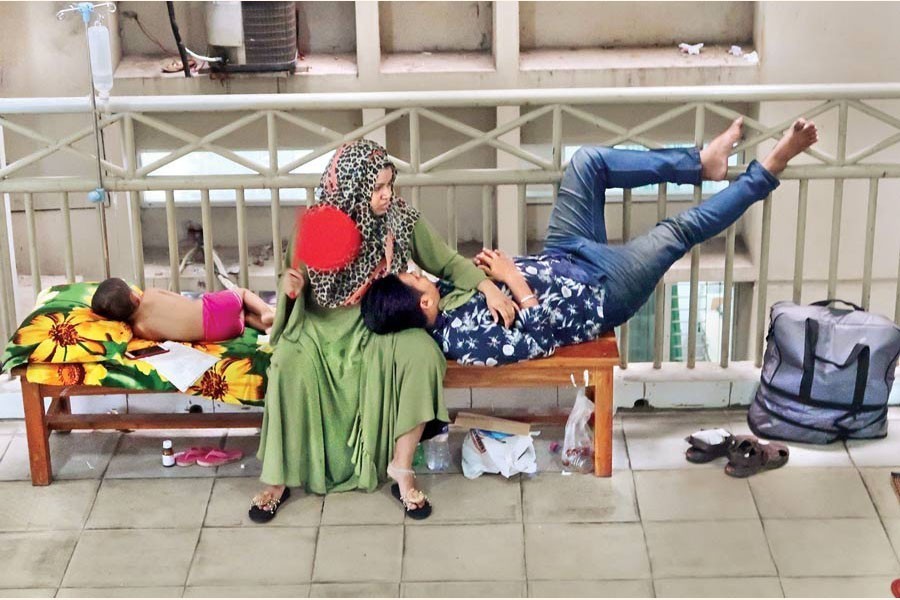Siyam Hoque
Published:2020-03-30 19:44:53 BdST
Non-COVID patients left in the lurch as medics abstain
The city's healthcare services for non-COVID-19 patients have come to almost a halt due to the abrupt absence of doctors who are staying home to prevent contracting new coronavirus, hospital people say.
This sudden absenteeism of general and speacialised healthcare professionals has deepened worry among people with pre-existing medical conditions and various other health complications, they said.
Besides, the emergency medical hotline service providers, which manage the appointment of specialised doctors, have stopped their operations, letting the situation deteriorate further.
This correspondent visited a number of public and private hospitals over the last several days and found the majority of doctors stopped caring for patients fearing contraction of the highly infectious virus that causes feverish and wheezing illness, known as COVID-19. The pneumonia-like diseases has already killed more than 30,000 people globally.
Abdul Hakim, a diabetic patient who does his regular checkup at Birdem Hospital, told the FE on Sunday that he went to meet a cardiologist there but found his chamber shut for an indefinite period.
He, then called Ibne Sina Diagnostic and Consultation Centre at Malibagh, but was dismayed by non-response.
"Where should I go now? My physical condition is deteriorating. If we don't get medicare services, it will be devastating for all," he said on a note of frustration.
This correspondent while visiting a number of health facilities in Dhaka city during last couple of days found closure notices at the chambers of 70 to 80 per cent physicians.
Talking to the FE, joint director of Birdem's hospital services division Dr Nazimul Islam said at least 70 per cent doctors of the hospital have been abstaining from their chambers.
"Who will take the risk of being infected with the deadly virus because we don't know who is infected and who is not," he said.
He added that some of the doctors continue advising their patients via social media.
The situation is no different in other healthcare facilities such as Shaheed Suhrawardy Medical College Hospital, Bangabandhu Sheikh Mujib Medical University, Holy Family Red Crescent Medical College and Hospital, Popular diagnostic Center, Shamorita Hospital, Ibne Sina Diagnostic and Consultation Center, and Labaid Hospital.
Ms Rabeya, who suffers from thyroid-related complications, said the relevant professor having chamber at Labaid hospital suggested she conduct several physical tests to get updated on her physical conditions.
She did her tests and received the reports but could not communicate with the professor, whose chamber hangs a notice of closure until April 14.
"I went to Shamorita Hospital to consult with another professor. Unfortunately, he has also closed down his chamber for an indefinite period. I also communicated with Ibne Sina, but in vain," she said.
Having failed to contact a specialist, she called privately-operated emergency hotline service provider 'Doctorola,' which has stopped picking up calls.
"Now, what will happen to me? It's very frustrating. If physicians stop caring for patients, then who will help saving lives," she asked.
Mohammad Saif, a front desk executive at Ibne Sina, said about 70 doctors run chambers.
"But 50 of them had shut down chambers soon after Bangladesh reported fatalities due to the novel coronavirus and the number of closure has kept rising since then," he added.
When contacted, Associate Professor (respiratory medicine) of BSMMU Dr Shamim Ahmed said discouraging patients, whose conditions are not that severe, from visiting physicians is a global healthcare practice when any pandemic arises.
"In such a situation, only emergency services are taken care of."
Allowing a large number of patients in chambers could enhance the risk of more infections as well as put additional strains on the country's limited healthcare system.
As part of avoiding other patients, the BSMMU plans to set up 10 hotlines for offering necessary health advice to the patients regarding their complications, Mr Ahmed said.
"People do not need to come to hospital. Considering the nature of patients', illness, the hospital authority will advise them to get admitted, if necessary," he added.
Health rights activist Dr Rashid-e-Mahbub said it is not unusual for doctors to refrain from their work because of poor safety measures.
Mr Mahbub, a specialist in surgery, suggested strengthening the online platforms of some hospitals as an alternative.
"There is a need for both government and physicians' willingness to make the best use of digital platforms so that prescriptions can be made available electronically in many cases."
Unauthorized use or reproduction of The Finance Today content for commercial purposes is strictly prohibited.


